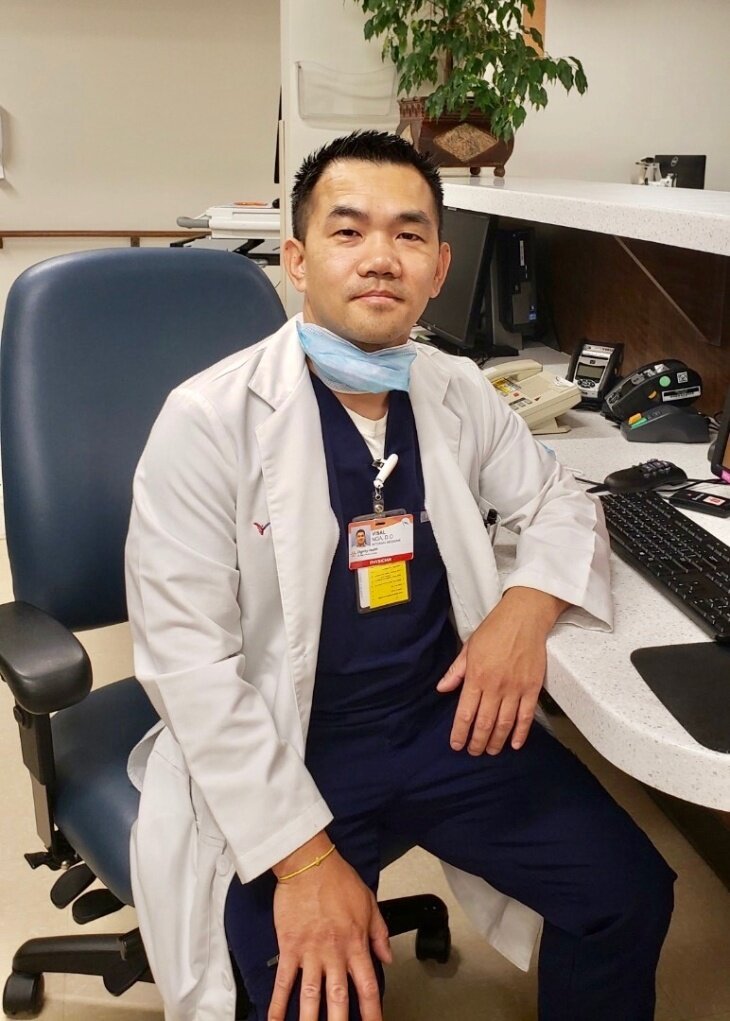Coronavirus Is Hitting Long Beach's Cambodian Community. But How Hard?
BY JOSIE HUANG
MAY 14, 2020
Cambodia Town in Long Beach. The city has the largest concentration of Cambodians outside of Cambodia. (Photo by Laurie Avocado via Flickr)
In Long Beach, Dr. Visal Nga pulls out his Khmer to speak to Cambodian patients about the virus he suspects is striking them harder than other Asians.
Most are refugees like him who left behind a country riven by genocide. But post-traumatic stress disorder followed many of them to Long Beach — home to the most Cambodians outside of Cambodia. So did the familiar gnaw of poverty, and new problems — high rates of diabetes and hypertension — all factors linked to the worst outcomes for COVID-19 patients.
This is not to mention, Nga said, that many Cambodian Americans face heightened exposure to the virus from holding service jobs and living in large, multi-generational households.
Dr. Visal Nga treats many Cambodian patients at St. Mary's Medical Center.
"Some of my patients have six people living in one single home, because it's expensive to live in Long Beach," said Nga, who works at St. Mary's Medical Center and is part of the Cambodian Health Professionals Association of America. "If one person gets infected, the entire family gets infected."
Nga would like to see if the data matches his concerns. The problem is public health departments are not breaking out COVID-19 data by ethnicity. For now, the city's tens of thousands of Cambodians and other Southeast Asians are categorized under the broad label of "Asian," masking any differences in how the coronavirus is treating ethnic groups with highly contrasting socioeconomic and health characteristics.
What we do know about the health data from Long Beach calls for deeper investigation: Asians make up 15% of those hospitalized for COVID-19 in the city, while comprising 13% of its population. Confirmed infections among Asians in Long Beach — 14% of the total caseload — is also slightly higher than their population share. That's not true elsewhere in L.A. County, where so far, existing data suggests a lower infection rate for Asians.
But without specifics, it's hard assess the true impact in Long Beach. Never has the absence of this information seemed so dire than during a pandemic."COVID-19 is revealing the importance of having disaggregated data to really reveal who is being impacted disproportionately within our communities," said Quyen Dinh, executive director of the Southeast Asia Resource Action Center.
Dinh said that disaggregated data could be used to allocate language and culturally-competent resources to fight the coronavirus in Southeast Asian communities.
(The Southeast Asia Resource Action Center (SEARAC) and Asian Americans Advancing Justice-Los Angeles (AAAJ-LA) )
"My heart just shuts down thinking about elders who may be in hospitals right now without any interpretation support," Dinh said.
In Long Beach, it is impossible to distinguish what Cambodians' share of its 153 COVID-19 cases among Asians is. But the city's health and human services director indicated Wednesday that her department could start capturing more data.
"That's something that we've been having some requests to do," Kelly Colopy said. "We're trying to determine how we can start to do that."
A 2015 march through Long Beach to commemorate the Cambodian genocide. (Susanica Tam)
Colopy said that 60 city employees are in the process of getting trained on how to do contact tracing that will involve interviewing patients.
"There is the potential at that point to ask further information, to maybe break down the Asian category into the Cambodian population and others," Colopy said.
Colopy said the city's health inequities team has so far been working more in African American and Pacific Islander communities — both especially hard-hit by the virus — but will likely be doing outreach among the city's Cambodian residents. Colopy's department has held a digital town hall in Spanish; she said the same could be done in Khmer.
Laura Som, left, is the executive director and founder of The Maye Center in Long Beach. (Photo courtesy of The Maye Center)
Laura Som is eager to help the city get better information. She leads the The MAYE Center for Healing and Cultivation of Self in Long Beach, which serves refugees dealing with trauma; many are older Cambodians who fled the Khmer Rouge regime decades ago. Lately, she's also been helping community members struggling with food insecurity and job losses caused by the pandemic.
"With the coronavirus, it severely affects our community because we're already vulnerable," Som said. "This is more like a compounded trauma that's just hitting us from all angles." '
She said Cambodian-specific health information could help the community get the help it needs. She can already envision compiling a list of COVID-19 patients with their addresses, ages and phone numbers that could be shared with city officials.
Seeing as many of her clients are distrustful of government, she said, they might be more apt to talk to someone like her, or other trusted community leaders.






